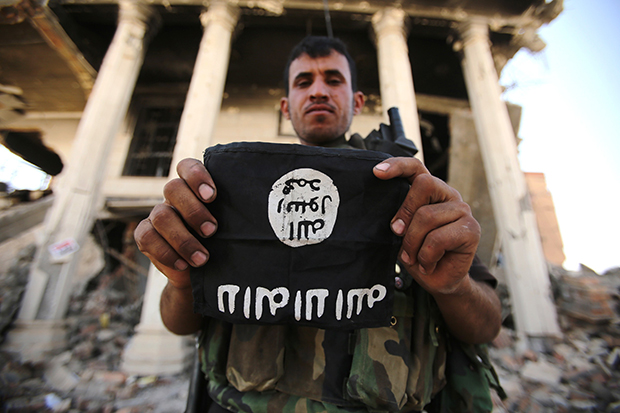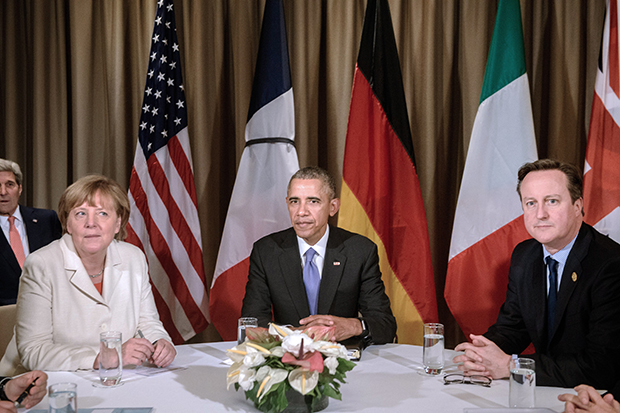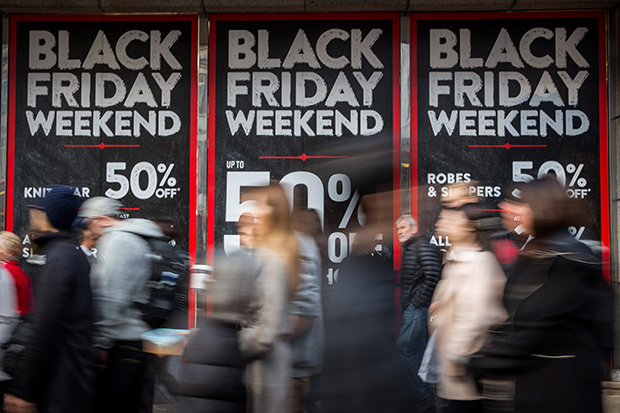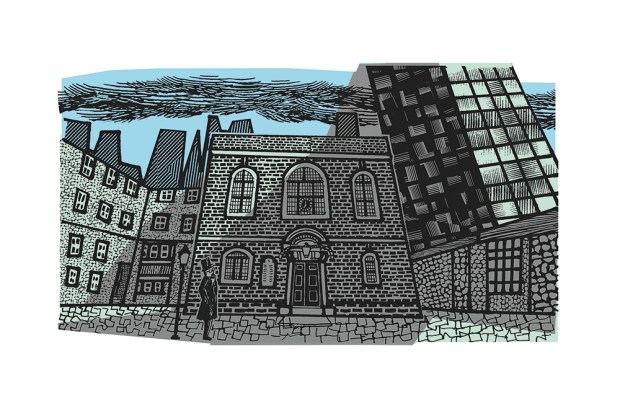‘They pull a knife, you pull a gun. He shends one of yoursh to the hospital, you shend one of hish to the morgue.’ Thus Sean Connery in The Untouchables, explaining how you fight a war ‘Chicago-style’. How would you adapt that, do we think, for our collective response to the Paris attacks? ‘They pull a gun, you pull a hashtag. They send 132 of yours to the morgue, you start calling them a slightly rude name.’
As they say on the internet: srsly?
Imagine you’re in Raqqa, having at last made hijrah from the family semi in Dudley. You’re chillaxing, maybe having a bit of a kickabout with the head of an apostate, when your friend calls you over to his laptop.
‘Look, brother. The kufirs have reacted to the blessed martyrdom operations in the hated capital of prostitution and garlic!’
‘What are they doing? Launching a ground invasion? Closing their borders?’
‘No — they’re — haha — they’re… you’ll not believe this, bruv. They’re still arguing over what to call us.’
‘You mean Isil or IS or Isis? I get a bit confused between those myself, if I’m honest.’
‘No. They’re really pissed off this time. They’ve started calling us Daesh, because they read somewhere that it offends us. Oh, except the BBC, which worries we shouldn’t be called terrorists because of bias, and they’re all arguing about that, too. ’
And there we can leave our jihadists, as they also say on the internet, rofling.
It’s perhaps symptomatic of a culture where name-calling is policed with a vigour once reserved for incitement to violence that the reaction to an act of real violence is to think of how we might retaliate by hurting someone’s feelings. It’s as if the giving and taking of offence — as recently seen on a university campus near you — has acquired the aura of a credible weapon of war. Could we no-platform Isis into submission?
Real energy is being spent on this. We fretted that we shouldn’t call it Islamic State because — zing! — it isn’t Islamic and isn’t a state. Stern proclamations were issued about using ‘so-called’, and I don’t doubt thought was given to whether miming scare quotes would compromise the dignity of the Ten O’Clock News. It’s as if we worried the average viewer might be tricked into sympathising for those head-hacking sodcopters because of an absence of proper disclaimers.
Now we’re favouring Daesh — the acronym for ad-Dawlah al-Islamiyah fi ‘l-’Iraq wa-sh-Sham; worth memorising for the pub quiz — which is what they call themselves, but whose acronymic form sounds like a rude word and doesn’t emphasise the Islamic element. Hilary Benn, meanwhile, has started calling them ‘Isil/Daesh’, which, at least to my ear, immediately conjures Captain Von Trapp crooning ‘Edelweiss’ to Julie Andrews.
Real energy has been spent, too, on worrying whether François Hollande’s declaration that France is at ‘war’ is a political mistake, because it dignifies Isis with statehood: nations only go to war with other nations, right? This sixth-form debating point has had actual airtime. I doubt that — keen though they are on national self-determination — the jihadis wonder whether to describe themselves as militants or terrorists or fighters as they’re strapping on their bomb-belts.
Even lightweight but unobjectionable acts of clicktivism on social media — 132 people dead in Paris; I’ll put the tricolore on my Facebook avatar — have prompted public soul-searching. Isn’t it, like, racist and Eurocentric to put a French flag on when you didn’t change your avatar for Beirut? And isn’t Facebook, like, this totally white corporate thing that’s trying to monetise your grief?
What all these phenomena have in common is that they make the western navel the centre of the action. They turn a murderous attack on civilians into a conversation among ourselves about the technicalities of nomenclature and the moral irreproachability of our own reactions. Words matter; but they don’t matter all that much.
And, yes: I’m aware that, in writing about the handwringing about the verbal shading of how we respond to the actual murders committed by actual murdering bastards, I risk adding an extra stroke of the chin.
So let’s return to our jihadis. From their end of the telescope I’d suggest that all this looks, at a personal level, like narcissism. It looks at a political level like tokenism. And it looks at a sociocultural level like what, in the days of the last great Evil Empire, they used to call decadence.
Got something to add? Join the discussion and comment below.
Get 10 issues for just $10
Subscribe to The Spectator Australia today for the next 10 magazine issues, plus full online access, for just $10.
You might disagree with half of it, but you’ll enjoy reading all of it. Try your first month for free, then just $2 a week for the remainder of your first year.















Comments
Don't miss out
Join the conversation with other Spectator Australia readers. Subscribe to leave a comment.
SUBSCRIBEAlready a subscriber? Log in